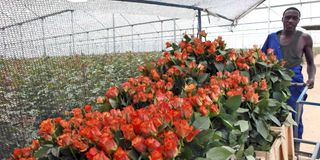Premium
Horticulture exports face tighter checks in new shift

A worker pushes a handcart filled with freshly harvested roses for export to the European market inside a greenhouse at Maridadi Flowers Limited in Naivasha.
Exporters of horticultural products face deeper scrutiny as the government tightens traceability of products, in a new move to combat low-quality exports that have tarnished the country’s image.
The Agriculture and Food Authority (AFA) plans to launch a horticulture traceability system, which will see export-meant products traced from the farm to the market, as regulators are brought to operate under a centralised platform.
Among the ills the National Horticulture Traceability System (NHTS) seeks to cure are dealing in immature products, application of unsafe chemicals, and general farm-to-market traceability by converging regulators to operate under one platform.
The Horticultural Crops Directorate (HCD) notes that while Kenya’s horticulture sector has been a vital contributor to the country’s economy, poor traceability of products, inefficient licensing and lack of integration with key regulatory agencies have hindered its growth and compliance with global market norms.
“To address the above challenges, AFA-HCD developed an NHTS to handle the issues with traceability. The system was audited and a number of issues were identified as necessary to be fixed before roll-out. Further, AFA-HCD would like to enhance the system to include registration, inspections, audit, licensing, import and export processes,” AFA said.
The new system is now expected to bring together the Kenya Revenue Authority (KRA), Business Registration Service (BRS), Kenya Plant Health Inspectorate Service (Kephis), Kenya Integrated Agriculture Management Information System (KIAMIS), and other agencies crucial to the horticulture sector, to streamline their operations.
Under the new system, services such as the registration of farmers, audit, licensing, and export processes will be collated.
KRA will offer tax compliance and revenue tracking services, while BRS will provide legal business entity verifications as Kephis verifies phytosanitary certificates.
The Pest Control Product Board (PCPB) will ensure farmers use approved agro-chemicals, KIAMIS will register and verify farms.
“The primary objective of this project is to upgrade the NHTS which will enable end-to-end traceability of horticultural products from farm to market, provide a digital registration and licensing module for farmers, exporters, and value chain actors, and enhance monitoring, efficiency & accuracy of data generation and compliance with statutory, domestic, regional and international standards,” AFA said.
The Netherlands is the largest market for Kenya’s horticultural exports particularly cut flowers, followed by the UK, France, the United Arab Emirates, and Germany.
China, India, and Kazakhstan are also emerging as major destinations for Kenya’s fresh produce, particularly avocados.





